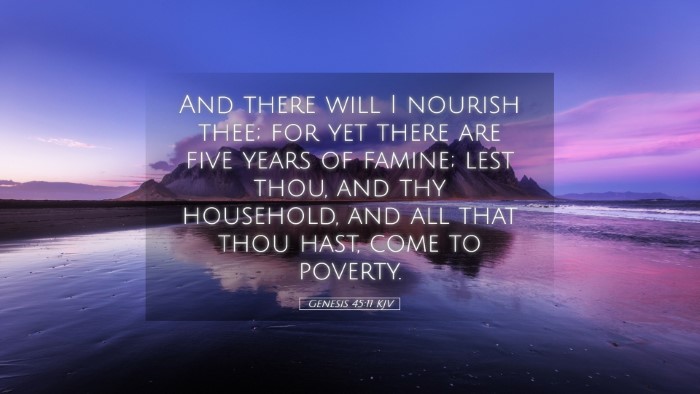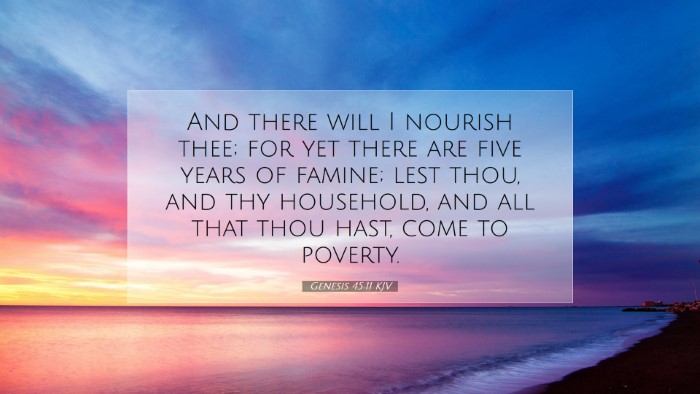Commentary on Genesis 45:11
Genesis 45:11 states:
"And there will I nourish thee; for yet there are five years of famine; lest thou, and thy household, and all that thou hast, come to poverty."
Contextual Analysis
This verse comes at a pivotal moment in the narrative of Joseph and his brothers. Joseph, having revealed his identity to his brothers, assures them during a time of famine that he will provide for them. This moment serves as a synthesis of familial reconciliation and divine providence.
Thematic Insights
Several key themes arise from this verse:
- Divine Providence: The assurance of nourishment during a long famine reveals God's provision, as Joseph is in a position of power to provide for his family.
- Forgiveness and Reconciliation: Joseph’s willingness to provide for those who wronged him demonstrates the heart of forgiveness, a central theme in the narrative.
- Family and Community: The emphasis on nourishing not just his siblings but their entire households underscores the interdependence of family bonds.
Commentary Insights
Matthew Henry’s Commentary
Matthew Henry notes that Joseph's statement is filled with both kindness and wisdom. He recognizes that the famine's severity necessitates provision not just for immediate family, but also for the broader household. Henry emphasizes that God often uses affliction to bring about reconciliation, which is vividly illustrated in this moment.
Henry also takes time to reflect on the implication of "poverty". The fear of economic ruin is a genuine concern that drives the narrative forward, and Joseph's provision serves as a counter-narrative to this fear.
Albert Barnes’ Commentary
Albert Barnes emphasizes the preparation and foresight demonstrated in this verse. He highlights that Joseph’s ability to provide stems from his position and track record of successful management. The prospect of five more years of famine stresses the urgency for his family’s dependence on him. Barnes argues that Joseph is not just acting out of familial obligation but rather as an agent of God's providence to ensure the survival of his entire lineage.
Adam Clarke’s Commentary
Adam Clarke provides a detailed exploration of the significance of the phrase "I will nourish thee." Clarke suggests that this nourishment is not mere sustenance; it encompasses emotional and spiritual restoration as well. He interprets Joseph's offer as indicative of his elevated understanding of God’s purposes—even through suffering. Clarke points out that a deeper biblical truth emerges: God’s care for His chosen people manifests through human agents, as seen in Joseph’s actions.
Applications for Today
In the context of modern pastoral work and theological study, Genesis 45:11 provides several timeless applications:
- Trust in God’s Provision: Believers today can draw comfort in recognizing that God plans for their sustenance and well-being, often through unexpected means.
- Importance of Forgiveness: Joseph’s reconciliation with his brothers serves as a potent reminder of the healing power of forgiveness, which is essential in Christian doctrine.
- Concern for Community: Pastors are called to emulate Joseph's concern for his family and community, ensuring that their ministries address both spiritual and physical needs.
Conclusion
Genesis 45:11 stands as a testimony of God's sustaining power during difficult times. By examining the insights from Matthew Henry, Albert Barnes, and Adam Clarke, we glean profound lessons in divine providence, mercy, and the importance of community. As we navigate the challenges of our own lives, may we remember Joseph's example and trust in God's provision for our spiritual and material needs.


